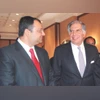)
The public fallout between Ratan Tata (right) and Cyrus Mistry altered a long-standing alliance | Photo: Reuters
The acrimonious fallout between Ratan Tata, Tata Group’s patriarch, and his successor, Cyrus Mistry, after Mistry’s dismissal from the Tata Sons board in 2016, altered the decades-old alliance between the Tata and Mistry families.
With new leaders like Noel Tata and Shapoor Mistry emerging, both families could well reassess their relationship to guide the Tata Group’s future, say old-timers.
Click here to connect with us on WhatsApp
Both families belong to India’s small Parsi community of roughly 60,000. The Tata Group traces its origins to Jamsetji Tata, Ratan Tata’s great-grandfather, who launched a textile trading business in 1868 and later established India’s first steel plant in Jamshedpur in Eastern India, a hydroelectric plant under Tata Power, and Mumbai’s iconic Taj Mahal Palace Hotel.
Meanwhile, the billionaire Mistry family founded Shapoorji Pallonji & Company in 1865, a now-global entity with a footprint across engineering, construction, and infrastructure.
Over the years, the two families worked closely, with the Mistrys acquiring an 18.4 per cent stake in Tata Sons — the holding company of the $165 billion Tata empire. The rest of Tata Sons shares were owned by Tata Trusts, (which owns 66 per cent) and other Tata group companies, besides members of the family.
In 2011, after a global search, Cyrus Mistry, the younger son of Pallonji Mistry, was named the next Tata Group chairman. He assumed the role in 2012 after Ratan Tata’s retirement at age 75. Until then, the Mistrys seldom talked about their investment in Tata Sons, and Pallonji Mistry was often described as the phantom of Bombay House – Tata group’s iconic headquarters in Mumbai. Cyrus Mistry’s appointment made him the second chairman without the Tata surname, a historic shift in the group’s century-long history. It surprised many.
Four years later, in October 2016, the Tata Sons board again sprung a surprise by deciding to remove Mistry as chairman.
Mistry, who then stated he was working to address the Tata Group’s “legacy issues,” including its struggling international steel manufacturing business, Tata Motors’ small car project, and its massive loss-making telecom ventures. These projects were initiated by Tata himself, and the public allegations did not go down well at Bombay House. This ultimately led to a legal battle between the two families with Mistry moving the court against his removal.
The conflict continued until 2021, when the Supreme Court ruled that Mistry’s dismissal by Tata Sons board was legal. The court upheld Tata Sons’ regulations on minority shareholder rights rendering Mistry shares illiquid unless approved by the company.
Mistry died in a car accident near Mumbai in September 2022. Meanwhile, Tata, who was ailing for some time, remained the chairman of the powerful Tata Trusts, focusing on philanthropy till his last day.
First Published: Oct 10 2024 | 9:16 PM IST





